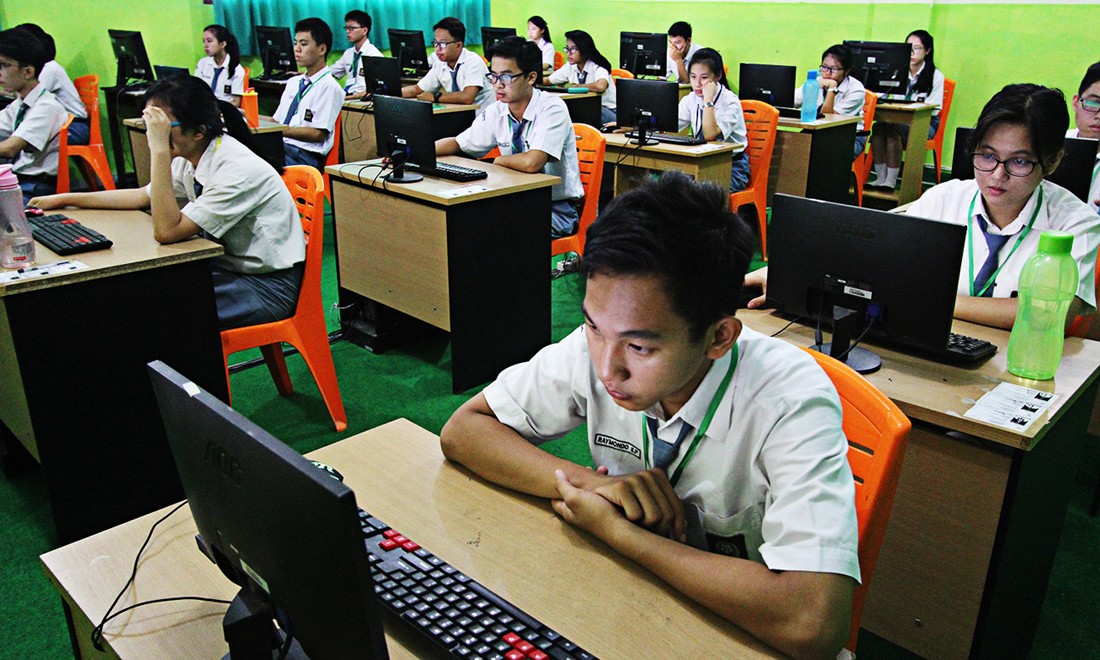Popular Reads
Top Results
Can't find what you're looking for?
View all search resultsPopular Reads
Top Results
Can't find what you're looking for?
View all search results‘Everything seems uncertain’: How teenagers navigate while life stuck at home
Given the different emotions in teenagers during self-isolation, an expert recommends that parents pursue different ways to help their children cope - and even make good use of this time.
Change text size
Gift Premium Articles
to Anyone
Living in self-isolation is daunting for Bima Mahardika, a high school senior in South Tangerang, Banten.
Just a few weeks ago, he was looking forward to getting away on a vacation with his classmates, making joyous memories to end their high school life. That would make for some nice graduation pictures, he told himself at the time.
Reality has roused the 17-year-old from his reverie as the COVID-19 pandemic has upended the lives of high school students in Indonesia. Schools are closed and have shifted to remote learning, likely for the rest of the school year. The long-awaited graduation ceremonies and proms might also be canceled.
Bima was well aware of the fact that his student life has plunged into uncertainty.
He is supposed to study for college admission tests but says he cannot concentrate out of boredom.
Bima loves going to the movies and hanging out with friends. Now that he is stuck at home, he has been spending time playing online games and doing a bit of cooking while trying to acclimate to a study-from-home lifestyle.
But, the longer it takes, the less fun he seems to be getting out of online games. He yearns for face-to-face conversations with his friends.
“I’m bored at home. I'm waiting for the moment when I will be able to meet my friends,” he said, adding that video calls were not enough.
Read also: Government to revamp student assessment to improve PISA scores
Bima’s mother, Erna Damayanti, said her son had been high-spirited to study remotely during the first few days in self-isolation. “But he was just less in the mood day by day,” she said.
Some researchers have developed models to project when the outbreak will end. Yet, uncertainty looms given the country's tardy countermeasures when COVID-19 emerged.
“We have no idea whether the [college] academic year will take place as scheduled. Now, everything seems uncertain,” Erna said.
Wikrama Wardhana, a tenth-grader in East Java’s capital of Surabaya, said online classes were getting “more and more uninteresting and difficult to understand" after weeks of remote learning.
Wikrama's friends had asked him to hang out at coffee shops several times, but he refused, believing his parents would have forbidden it.
Now, he says, he seems “unable to continue to ignore” the urge to gather with his peers.
Read also: ‘It’s fun!’: Underrated TVRI becomes students' favorite during stay-at-home orders
The physical absence of peers during this coronavirus outbreak undeniably requires internet access, which sometimes forces teenagers to defy stay-at-home orders.
Doni, 16, a student from Sawotratap in Sidoarjo, East Java, no longer received pocket money from his father, an informal worker, after his school was closed down amid the outbreak.
Having too little money to buy cellular data plans, he instead opted to go to a nearby warung kopi, or coffee stall, that sells affordable beverages from Rp 3,000 (2 US cents) to Rp 5,000, so that he can use its free WiFi to connect with friends.
There is no research yet on the impacts of the unprecedented self-isolation on adolescents, but they tend to display a mix of negative and positive emotions over quarantine, according to the chairwoman of the Indonesian Clinical Psychologists Association's (IPK) Jakarta chapter, Anna Surti Ariani.
“The impacts of [self-isolation] on teenagers are varied -- ranging from positive to negative emotions,” she said.
Boredom as a negative emotion inflicted by the monotony of daily activities is evident in many teen cases the group is handling. Adolescents are highly attuned to peer groups, Anna said.
“Teens having more time to do hobbies, for instance, are likely to respond with positive emotions,” she added.
The COVID-19 social distancing hit 17-year-old senior high school student Annisa Laksmi, known as Dinda to her friends, differently.
She is well aware that the pandemic has brought much daily activity to a standstill but says she has accepted the changes to the way people live, interact and work -- or, in her case, study.
She said she learned about introspection during the quarantine.
"I’m getting to know more about myself or what I need, because before I had been too busy studying and taking after-school courses. I often forgot that I also needed proper sleep, a healthy diet and physical exercise," Dinda said. "This quarantine makes me think deeply about myself."
Dinda also said she had learned new things, such as cooking and working out using fitness programs offered by a mobile app.
Given the different emotions in teens, Anna said, parents should pursue different ways to cope.
“But always give them some time to connect [virtually] with their friends, because being at home does not necessarily mean that their time is for family affairs only," she said.
Read also: COVID-19: Central Java students demand 'creativity' amid boredom of remote studying
Child and family psychologist Vera Itabiliana Hadiwidjojo of the University of Indonesia's Institute of Applied Psychology (LPT-UI) suggested that family members communicate better with teens.
"[Teenagers] need a good listener and someone to talk to. Help them look for creative ideas to do during the pandemic. Also, encourage them to work out, because it will induce the release of ‘antistress’ hormones," she said.










